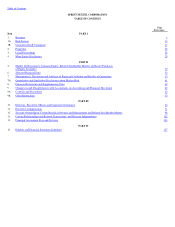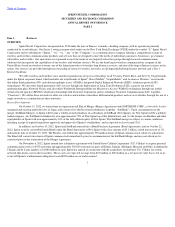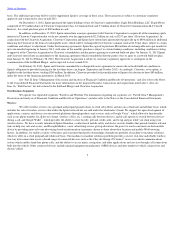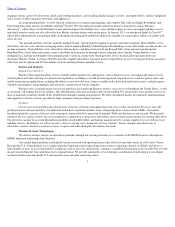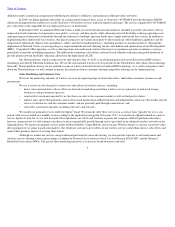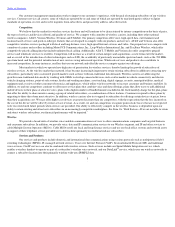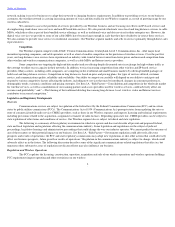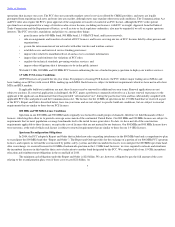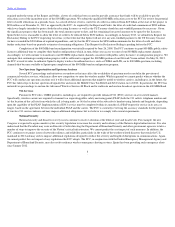Sprint - Nextel 2012 Annual Report Download - page 13
Download and view the complete annual report
Please find page 13 of the 2012 Sprint - Nextel annual report below. You can navigate through the pages in the report by either clicking on the pages listed below, or by using the keyword search tool below to find specific information within the annual report.
Table of Contents
compensation rate. These rates will be reduced over the next several years as the industry transitions to bill
-
and
-
keep methodology for the exchange
of all traffic. Providers of interconnected VoIP will continue to be required to contribute to the federal Universal Service Fund (USF), offer E911
emergency calling capabilities to their subscribers, and comply with the electronic surveillance obligations set forth in the Communications Assistance
for Law Enforcement Act (CALEA). Because we provide VoIP services and transport VoIP
-
originated traffic, the FCC's rate prescription decision is
expected to reduce our costs for such traffic over time as well as reduce disputes between carriers that often result in litigation.
International Regulation
The wireline services we provide outside the United States are subject to the regulatory jurisdiction of foreign governments and
international bodies. In general, we are required to obtain licenses to provide wireline services and comply with certain government requirements.
Other Regulations
Network Neutrality
On December 22, 2010, the FCC adopted so
-
called net neutrality rules. The FCC rules for fixed broadband Internet access services consist
of: (a) an obligation to provide transparency to consumers regarding network management practices, performance characteristics, and commercial
terms of service; (b) a prohibition on blocking access to lawful content, applications, services and devices; and (c) a prohibition on unreasonable
discrimination. The FCC acknowledged, however, that mobile broadband is in its early stages of development and is rapidly changing and accordingly
adopted lesser obligations for mobile providers. Mobile providers must: (a) provide transparency to consumers in the same manner as fixed providers;
and (b) not block access to lawful websites and applications that compete with the provider's own voice or video telephony services. Other rules
applicable to fixed broadband, including no blocking of other applications, services or devices, and the prohibition on "unreasonable discrimination,"
do not apply to mobile providers. Because the net neutrality rules applicable to mobile broadband are relatively narrow and because we have deployed
open mobile operating platforms on our devices, such as the Android platform created in conjunction with Google and the Open Handset Alliance, the
rules should not adversely affect the operation of our broadband networks or significantly constrain our ability to manage the networks and protect
our users from harm caused by other users and devices.
Truth in Billing and Consumer Protection
The FCC's Truth in Billing rules generally require both wireline and wireless telecommunications carriers, such as us, to provide full and fair
disclosure of all charges on their bills, including brief, clear, and non
-
misleading plain language descriptions of the services provided. In response to a
petition from the National Association of State Utility Consumer Advocates, the FCC found that state regulation of CMRS rates, including line items
on consumer bills, is preempted by federal statute. This decision was overturned by the 11th Circuit Court of Appeals and the Supreme Court denied
further appeal. As a consequence, states may attempt to impose various regulations on the billing practices of wireless carriers. In addition, the FCC
has opened several proceedings to address issues of consumer protection, including the use of early termination fees, the FCC has opened an
investigation into “bill shock” concerning overage charges for voice, data and text usage, and the FCC has proposed new rules to address cramming.
The wireless industry has proactively addressed many of these consumer issues by adopting industry best practices such as the addition of free
notifications for voice, data, messaging and international roaming to address the FCC's bill shock proceeding. If these FCC proceedings or individual
state proceedings create changes in the Truth in Billing rules, our billing and customer service costs could increase.
Access Charge Reform
ILECs and competitive local exchange carriers (CLECs) impose access charges for the origination and termination of long distance calls
upon wireless and long distance carriers, including our Wireless and Wireline segments. Also, interconnected local carriers, including our Wireless
segment, pay to each other reciprocal compensation fees for terminating interconnected local calls. In addition, ILECs and CLECs charge other carriers
special access charges for access to dedicated facilities that are paid by both our Wireless and Wireline segments. These fees and charges are a
significant cost for our Wireless and Wireline segments. In November 2011, the FCC adopted comprehensive intercarrier compensation reforms,
including a multi
-
year transition to a system of bill
-
and
-
keep for terminating switched access charges. These reforms have decreased and are expected
to continue to decrease our terminating switched access expense over time.
10


